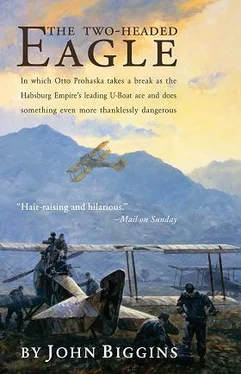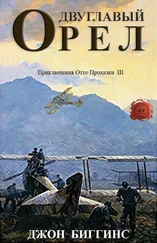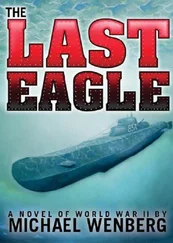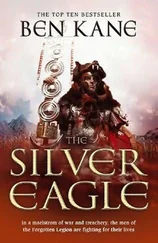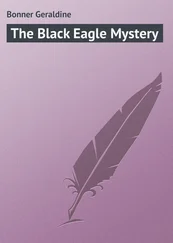And that was the end of the matter as far as we were concerned. I signed a few slips of paper for the farmer and his wife, who had by now stopped screaming and invoking the saints, for want of breath. Then Toth and I went back to our aeroplane to take off for Caprovizza airfield. So that, if you please, is how I came to achieve what I suppose must be my one claim to singularity in the course of something over a hundred years of earthly existence: that of being the only man—so far as I know—ever to have brought down two airships.
There was a wondrous row about it all when I made my report to Hauptmann Kraliczek that evening, back at Fliegerfeld Caprovizza. Not only had I brought down a lighter-than-air machine when there was no appropriate form on which to report the fact; I had made a complete nonsense of his graphic projections for the entire month of August, no less. Fliegertruppe standing orders clearly stated that for the purposes of computing pilots’ aerial victories, one airship would be regarded as equivalent to five heavier-than-air machines; and this meant that Kraliczek’s new, reluctantly introduced line for Enemy Aircraft Destroyed climbed so abruptly when it reached the month of August that not even the airship itself could have gained altitude with such speed. In the end Kraliczek had to paste an extension-piece of squared paper above the main graph to accommodate the line. That was bad enough, but when I told him how we had done it—bombing the airship with a wireless set—his normally pallid features took on the livid white hue of a fish’s underbelly.
“You . . . you . . . what?” he stammered, aghast.
“Obediently report that I dropped the wireless set on it. I had fired five clips of ammunition into the thing to no effect and there was nothing else that we could do, short of ramming it. But where’s the problem? Surely an enemy airship destroyed is worth a wireless set at any rate of exchange?”
“What do you mean, worth a wireless set, you maniac! That wireless apparatus was a top-secret item of equipment, of inestimable value to the enemy. And now you’ve gone and dropped the thing on their side of the lines! Du lieber Gott . . . Do you realise that you could be court-martialled for betraying military secrets to the enemy?” I tried to persuade him that after a fall of something like three thousand metres a fragile item like a wireless set would have virtually exploded on impact, transforming itself into a thousand unrecognisable fragments. But he was unpersuaded: unfortunately he remembered the freakish incident in May when Toth’s observer, the ill-fated Leutnant Rosenbaum, had fallen from about the same height to land inside a convent greenhouse in Gorz, stone dead but with hardly a mark on him. He was silent for some time, staring at me reproachfully from behind his spectacles. At last a faint smirk of selfsatisfaction returned some colour to his features.
“Herr Linienschiffsleutnant,” he said in his most solemn tones, “oh my dear Herr Linienschiffsleutnant, it is my duty to inform you that you are in the very deepest trouble. There is only one course of action open to you. I shall delay making my report on this disgraceful incident on condition that you and Zugsfuhrer Toth fly out at the earliest opportunity to try and find the remains of the wireless set. If you can bring it back—even in pieces—then the War Ministry may—I say only may—be content with charging you its cost of, er, let me see . . . 7,580 kronen. If you are unable to find it then I am afraid that my report of its loss will go to 5th Army Headquarters by tomorrow evening at the latest. Is that clear?”
I protested that this was a ludicrous assignment; that quite apart from the hazards of landing close behind the enemy lines, I had no real idea of where I had dropped the thing to the nearest square kilometre or so, and that even if I had, it would either have smashed into innumerable fragments on the rocks of the Carso edge or buried itself deep in the Isonzo marshes.
However, war is war, and an order from one’s commanding officer is an order—especially when backed by a threat of immediate court martial. So at first light the next morning Toth and I took off from Caprovizza airfield on what looked set to be the most hazardous mission of my entire three-week career as an officer-observer.
By comparing our own recollections of the previous day’s events and by checking them against the map, we had eventually narrowed our area of search down to a two-kilometre square of marshland and pasture between the town of Monfalcone and the River Isonzo, south of the Cervignano road. We had managed to contact a number of front-line observation posts by telephone and they more or less confirmed this, as did the look-outs of the battleship Prag, who had taken bearings as they saw us close with the airship. Even so I was not at all hopeful of finding anything other than death or captivity as we set off that morning. The search area was only a couple of kilometres behind the Italian lines and would doubtless be stiff with troops and guns. The best that we could hope for was that the sheer bare-faced effrontery of our mission—flying at tree-top height over enemy territory in broad daylight—would so dumbfound the Italians that they would be put off their aim.
We crossed the lines east of Gradisca, taking advantage of early- morning mist, then flew the Lloyd in a wide half-circle to land on a stretch of pasture in a thinly populated region of marshland south of Cervignano. We waited there until about 1000, by which time the sun was clearing the last rags of mist from the flatlands, then took off again to approach Monfalcone from the west, flying low and hoping to be taken for an Italian aeroplane if anyone noticed us. Then the fun began. The first two passes over the area of search went well—except that I saw not a sign of the wireless set as I scanned the ground beneath through my binoculars. But on the third sweep, heading south this time, we passed over a tented encampment and some sentry noticed the black crosses beneath our wings. There was a sudden outbreak of bright little flashes among the tents as they opened fire. Machine-gun posts joined in, sending streams of tracer up at us, and before long the flash-puffs of anti-aircraft fire were following us as we flew—then bursting above and ahead of us as they found the range, kicking us about as urchins kick a tin can in the street. Then I saw it, in the middle of a field: a battered, splayed-out metal box of about the right size and shape for our wireless set. I signalled to Toth to turn us round and land.
It was a magnificent piece of flying, even by Toth’s high standards: to bring an aeroplane about and put it down under fire on a space pehaps a hundred metres square. I can only assume that we survived either because the Italian gunners thought that we had been hit, or perhaps because they thought that we had gone mad. At any rate, their fire slackened for just long enough to enable me to scramble out of the cockpit and run to the metal box. Sure enough, it was the remains of the wireless set. The box had burst open on impact and its contents had been distributed over a good fifty metres’ radius. I saw a valve lying near by, miraculously intact, and the metal base of another. I knew enough about wireless to know that the valves were what would really be of interest to an enemy intelligence officer, so I gathered them up, then ran back to the Lloyd, which was standing by with its engine idling. Just as I reached it the first Italian soldiers appeared at the field’s edge. They shouted, then began to fire. Breathless and too confused by it all to be frightened, I quickly cocked the Schwarzlose and fired a couple of bursts at them to keep them at their distance while Toth turned the aeroplane’s nose into the breeze and pushed the throttle forward. Bullets cracked around us as we wobbled into the air. Against all the odds we had done it: found the remains of the wireless set and secured enough of it to convince even the most obdurate security officer that the thing had smashed on impact to a degree where no one would ever be able to deduce how it had worked.
Читать дальше
